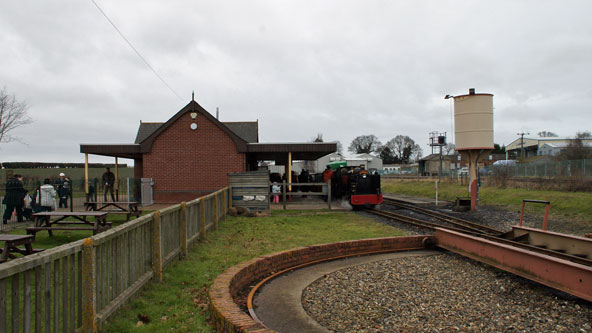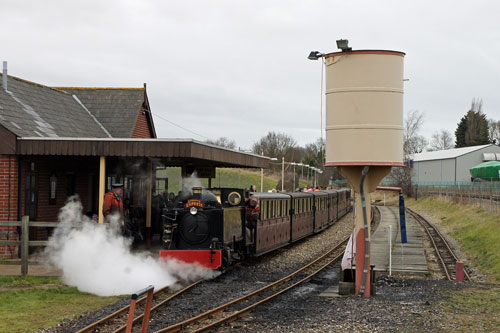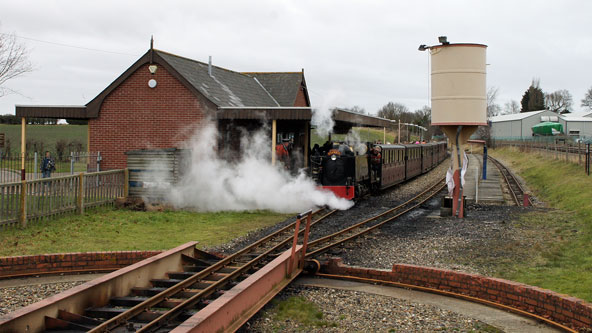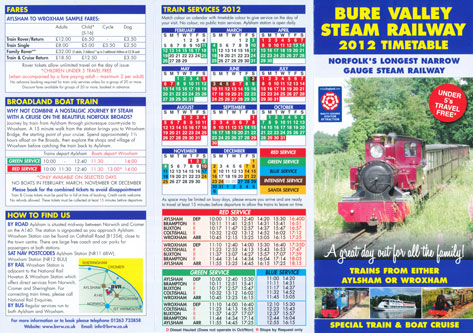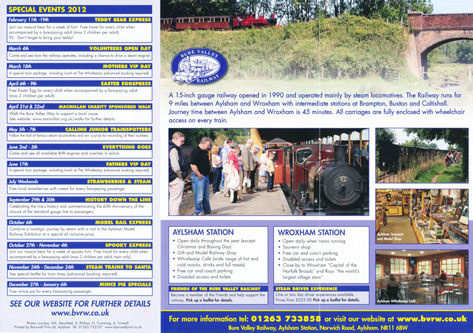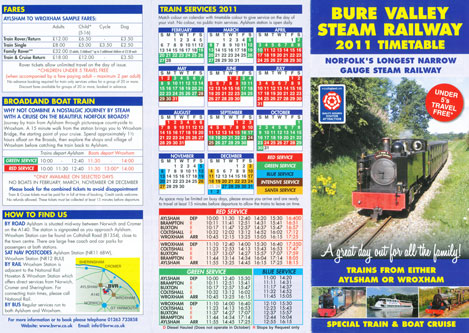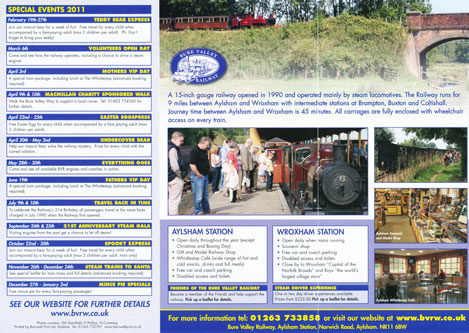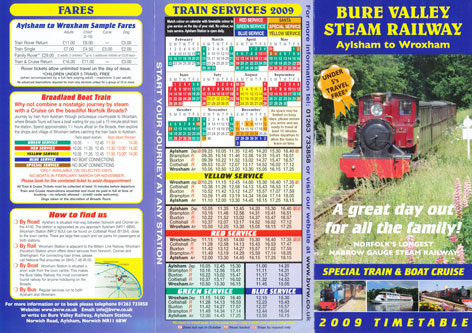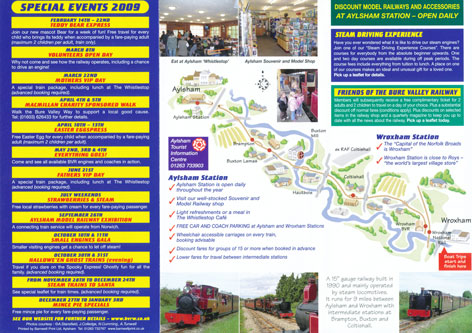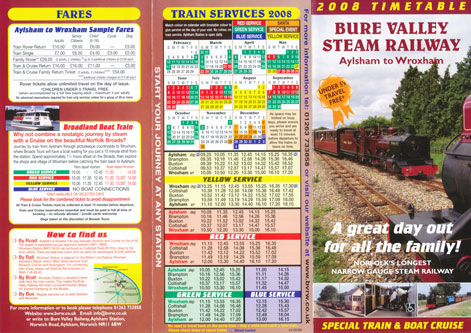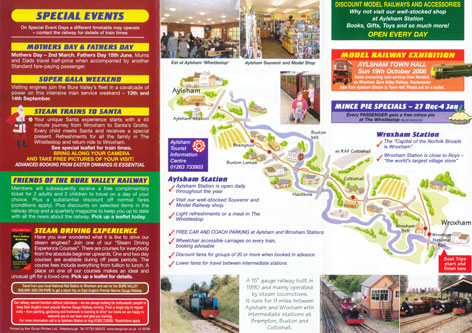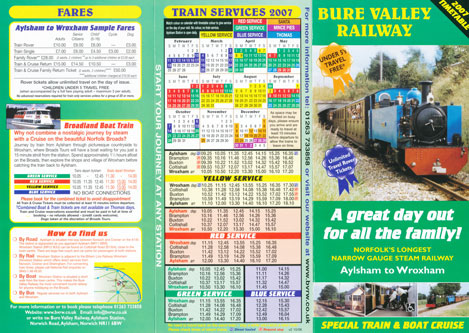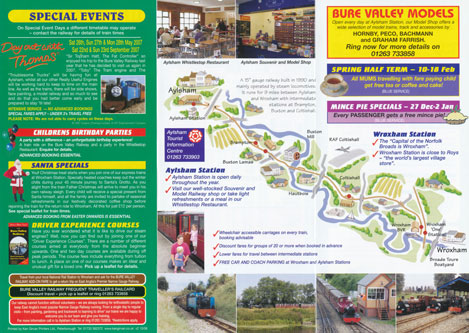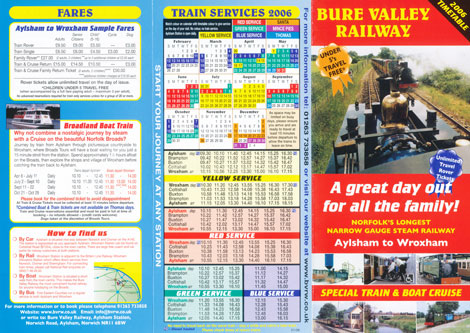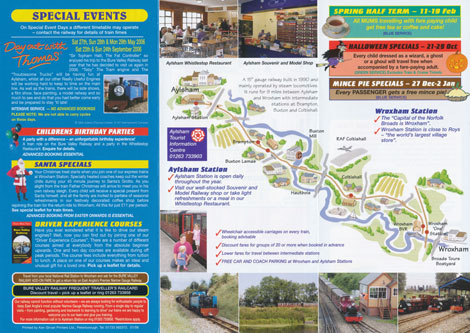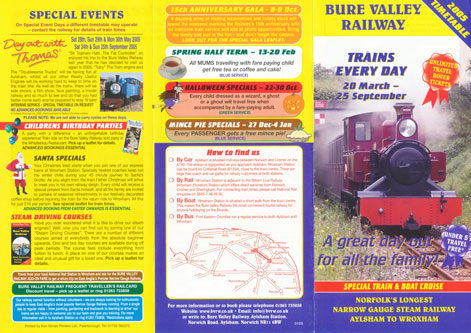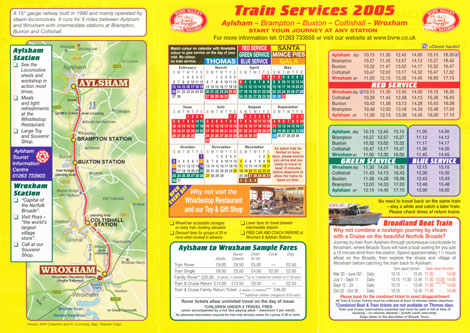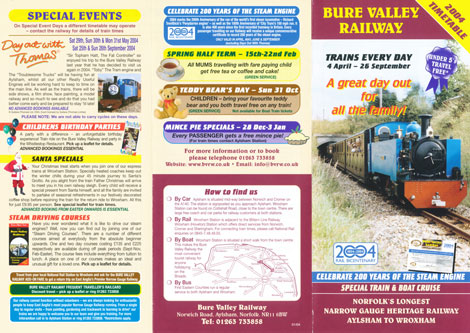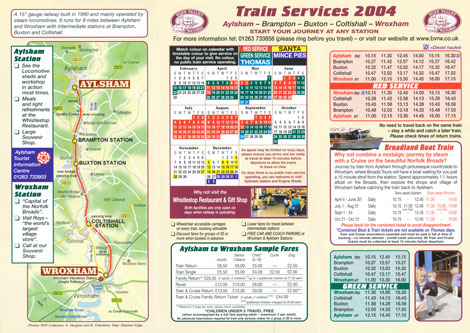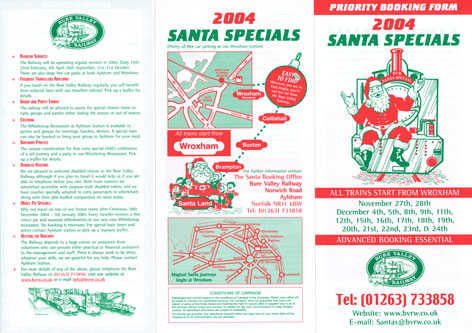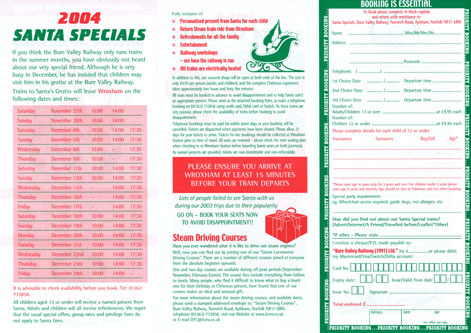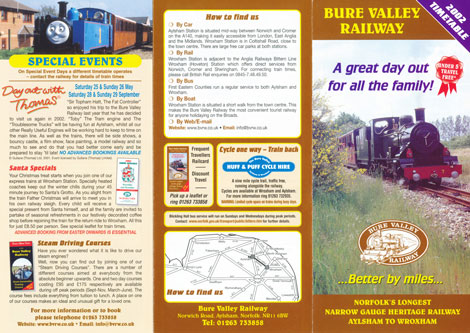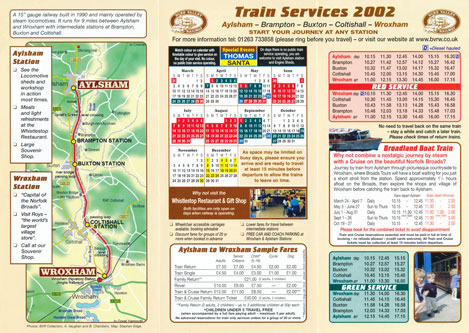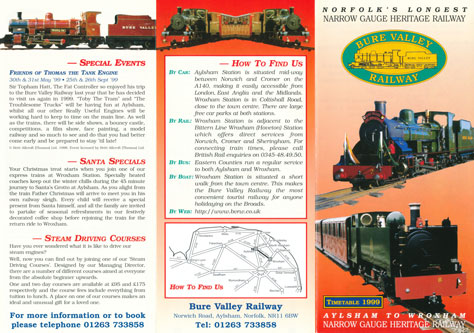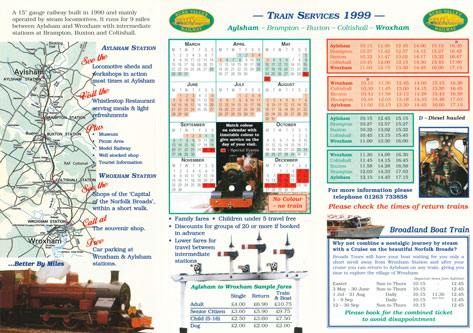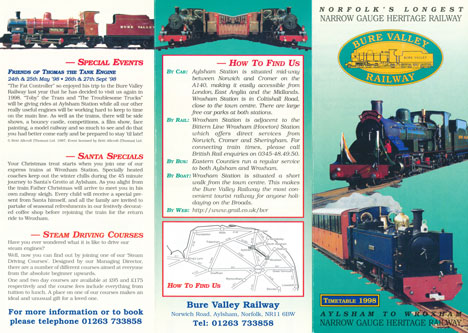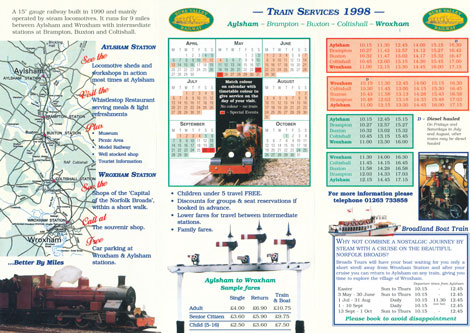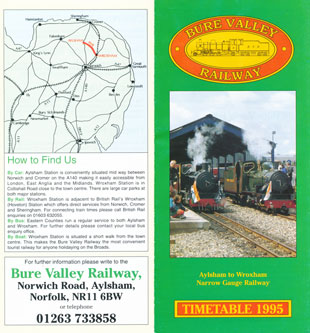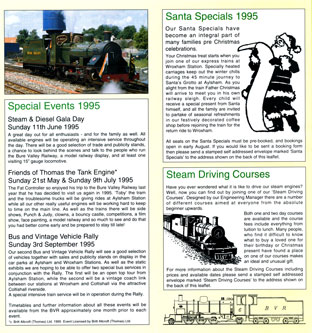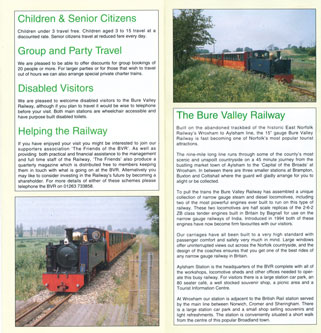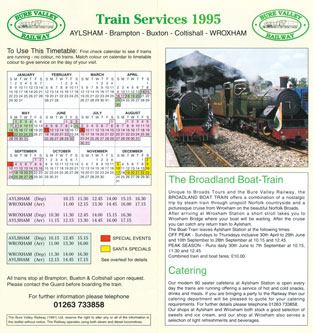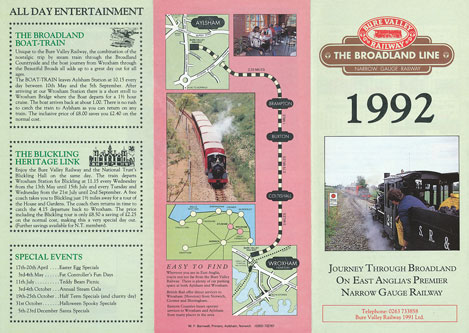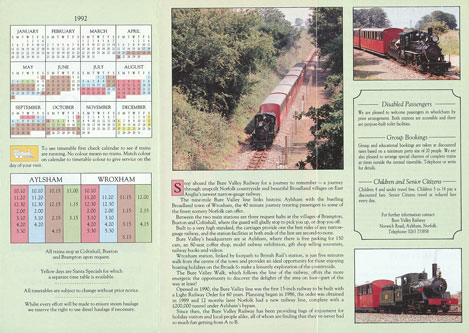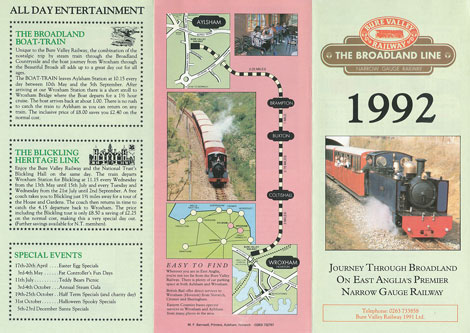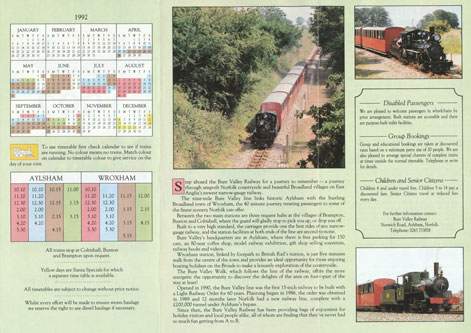|
|
|
| |
Each image links to a larger
copy which will open in a new window
|
|
|
The Bure Valley Railway was opened on
10th July 1990 along the trackbed of the the East Norfolk Railway's branch
from Wroxham to Aylsham (9 miles / 14.5 kilometres). There are intermediate
halts at Brampton, Buxton and Coltishall. Engineering works include 17
bridges, one a 105 ft (32 m) long girder bridge over the River Bure in
Buxton as well as Aylsham Bypass Tunnel under the A140 at Aylsham (the only
operational runnel in Norfolk).
The ENR started operations in 1877 when the East Norfolk Railway opened from
Norwich to Cromer, with an extension from Wroxham to Aylsham in 1880. The
ENR was taken over by the Great Eastern Railway in 1882, which was
amalgamated into the London & North Eastern Railway in 1923. The railway was
nationalised in 1948. In 1952 the passenger service stopped, but the freight
service continued. Buxton Lammas, as it was then known, closed for goods in
1964, and Aylsham and Coltishall in 1974. Through freight trains continued
to run over the line until 1981 and the line through Aylsham formally closed
on 6 January 1982. Track-lifting began the following year.
Broadland District Council (BDC) and Norfolk County Council (NCC) bought the
trackbed from Hellesdon to Attlebridge and converted it into a footpath and
BDC wanted to purchase the Wroxham-Aylsham section to extend the footpath
network. It was decided to build a 15inch gauge railway alongside the
footpath, receipts from the railway paying for the footpath. BDC entered
into partnership with R.Hudson and J.Edwards who had experience of 2ft and
7.25in gauge railways at the Pleasurewood Hills theme Park in Great
Yarmouth. The Bure Valley Railway Ltd was formed with Hudson, Edwards and
other directors. The route was cleared and bridges repaired. Half of the the
original trackbed became the new railway, with the other half laid out as a
footpath. Stations were built at Wroxham (actually in Hoveton) and Aylsham
with halts at Brampton, Buxton and Coltishall. Passing loops were created at
Brampton, Hautbois and Coltishall. Aylsham station was given an overall roof
to protect the rolling stock. The inaugural train was pulled by
Winston Churchill
and Samson loaned
from the Romney, Hythe & Dymchurch
Railway (RH&DR), although they could not maintain brake pressure and the
diesel was called out to rescue the train. However, the original Bure Valley
Railway Company was closed down in January 1991 following the bankruptcy of
its parent company. BDC found a new lessee, Mike Hart, and services resumed
in April 1991, again using RH&DR
stock. A varied selection of locos were acquired, including an American
outline 2-4-2 named Sydney, which had been built as Siân
for the Fairbourne Railway. Sandy River No.24 was another American
outline loco with 2-6-2 wheel arrangement, which was built in 1990. These
locos needed to double-head heavy trains and a more powerful solution was
required.
In 1993, Robert Baker took over the main shareholding and purchased a new
loco No.6 Blickling Hall from Winson Engineering. This was a
half-scale version of the ZB 2ft 6in gauge 2-6-2 locos on Indian Railways.
She was joined in 1994 by sister loco No.7 Spitfire. These were
powerful enough to pull the heaviest trains single-handed. Ownership changed
again in 1995 when shares were bought by a group of enthusiasts who formed
Westernassets Ltd and drastically reduced the costs of the operation with
greater volunteer use through the Friends of the Bure Valley Railway. Two
further ZB locos were built using the standard chassis and boiler but with
tank locomotive outlines based on Vale of Rheidol and Leek and Manifold
prototypes. They were originally oil burners but later converted to coal.
Website:-
www.bvrw.co.uk
Phone:-
+44 (0)1263 733858
|
|
|
|
|
|
All images link to larger
copies which will open in a new window/tab
The Bure Valley Railway was opened on
10th July 1990 along the trackbed of the the East Norfolk Railway's branch
from Wroxham to Aylsham.
Website:-
www.bvrw.co.uk
Phone:-
+44 (0)1263 733858
Initial BVR trains were operated by locos on loan
from the Romney, Hythe & Dymchurch
Railway (RH&DR), initially
Winston Churchill and Samson.
Every loco in the RH&DR fleet has
subsequently visited the BVR.
A varied selection of locos were acquired, including
an American outline 2-4-2 named Sydney, which had been built as
Siân for the Fairbourne Railway. Sandy River No.24 was another
American outline loco with 2-6-2 wheel arrangement, which was built in 1990.
These locos needed to double-head heavy trains and a more powerful solution
was required.
I
n 1993, Robert Baker took over the main shareholding of the BVR and
purchased a new loco No.6 Blickling Hall from Winson Engineering. This was a
half-scale version of the ZB 2ft 6in gauge 2-6-2 locos on Indian Railways.
She was joined in 1994 by sister loco No.7 Spitfire. These were
powerful enough to pull the heaviest trains single-handed. Ownership changed
again in 1995 when shares were bought by a group of enthusiasts who formed
Westernassets Ltd and drastically reduced the costs of the operation with
greater volunteer use through the Friends of the Bure Valley Railway. Two
further ZB locos were built using the standard chassis and boiler but with
tank locomotive outlines based on Vale of Rheidol and Leek and Manifold
prototypes. The two ZB tank locos were originally oil burners but later converted to coal.
BVR No.4
Sydney/Siân
(Built: 1963 - BVR: 1990-1994)
Siân was built in
1963 for the Fairbourne Railway in Wales. She was named after the 15 year
old daughter of the railway's solicitor, who was a close friend of the
railway owner. The design was almost the same as a loco called Katie
which ran on the railway at Dudley Zoo. They had both been designed in 1951
by Ernest Twining (who used to work for the model engineer Bassett-Lowke).
Both engines were built by Trevor Guest Engineering Co. of Stourbridge, who
made other locomotives for the Fairbourne Railway. Both locos were painted
Mid green with indian red frames, although shades varied from year to year.
Katie was also bought by the Fairbourne Railway in 1965 and both
locos were the main motive power on the line until 1984. Under new ownership
in 1984, Katie was sold to Haigh Hall near Wigan. Siân was
heavily rebuilt into an American outline steam engine called Sydney
for the 1985 season. It was then sold to Littlecote Park in Hungerford,
Wiltshire. The Fairbourne Railway is now a 12 ¼" railway.
When the railway at Littlecote closed down in 1990,
Sydney was up for sale again. Siân had visited Ravenglass
in 1976 when Siân first impressed the Ravenglass crews. A
consortium of Ravenglass and Eskdale Railway volunteers formed a group
intending to purchase the loco for use at Ravenglass. However, the newly
built Bure Valley Railway in Norfolk were desperately in need of motive
power and outbid the Ravenglass consortium. Whilst at the Bure Valley,
Sydney was altered into a more conventional outline and painted maroon.
It was renamed Siân again, although it was not to the original
design. In 1994, the Bure Valley Railway had built their own locomotives and
they decided to sell Siân. The Ravenglass consortium was already
set up for purchasing the loco, and so the sale went through quickly. A
clause of the sale was that the loco should remain on the BVR for 1994. By
this time, Siân had passed through three owners in the space of ten
years, none of whom had a long term interest in Siân. As a result,
the loco was worn out and needed a lot of mechanical work as well as
cosmetic improvements.
The loco was still serviceable, so in 1995 and 1996,
Siân was hired to the Cleethorpes Coast Light Railway. Earning
money in the summer season, the overhauls would take place in the winter
months, using all the money earned plus extra from group members pockets. It
was a difficult time, as no sooner had one repair been effected, then
something else would break. By April 1997, the locomotive was now beginning
to resemble the Siân that originally appeared in 1963. 1997 was
also spent at Cleethorpes, however no agreement could be made for the 1998
season. Siân had to find a new home.
In May 1998, Siân was delivered to the
Kirklees Light Railway, near Huddersfield, for the 'Friends of Thomas'
weekends in June and July. This railway was ideal for this design of loco,
where 5 coach trains were easily hauled along the 4 mile line.
Unfortunately, the boiler developed badly leaking tubes, and failed on the
26th of July. An inspection revealed that further work was required to bring
the boiler into a satisfactory condition, including a new front tubeplate.
The boiler would have had to be removed in November that year in any case,
when its seven yearly insurance certificate expired. It was decided to start
the major overhaul straight away, so the loco was taken back to the group
headquarters in Ravenglass. With an 18 month period to do the overhaul, no
stone was left unturned. The boiler was stripped down and new tubeplates
made for both ends. The chassis was completely overhauled, with new
bearings, pins and bushes. Some astonishing faults were found, such as the
driving axle quartering was nearly 3° out on the rear axle and the left hand
valve gear was only travelling 75% the distance of the right hand side!
After such a major
overhaul, there were surprisingly few teething troubles, but a leaking dome
flange meant that the 'n steam' boiler inspection had to be delayed 4 days.
Siân's first passenger train was hauled on the 27th of April 2000
at Ravenglass. Siân attended galas at Ravenglass from Easter to May
Day and the
RH&DR on
May 14th. Siân spent summer 2000 at Windmill Animal Farm. In 2001,
she attended the same galas, plus a weekend at Cleethorpes for Spring Bank
holiday and also visited Romney in 2002 and the Bure Valley Railway in 2005.
Siân now spends most of her time at Windmill Animal Farm, being run
on summer weekends and special occasions. Driver experience courses are also
available and it is hoped that Siân will visit other railway in the
near future. (Ref:
www.sianprojectgroup.com)
American outline Sydney on the BVR, carrying
the number 4 on a Santa Special
Photo: © Ian Boyle
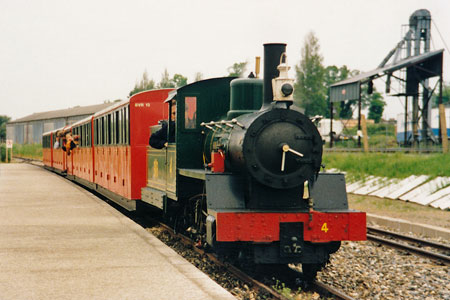
BVR No.1 Wroxham Broad
(Built: 1964 - BVR:1991- )
The locomotive was originally ordered from Guest
Engineering & Maintenance (Ltd) in 1964 for Captain Hewitt who then
owned Katie. sister engine to
Siân.
The new loco was to be a larger 2-6-2 version of Katie/Siân
and the intention was to use both engines on a sugar plantation in the
Bahamas. This fell through, followed soon afterwards by the death of Captain
Hewitt The order was
cancelled after construction had begun and the locomotive was subsequently
completed as a steam-outline petrol-hydraulic and was named
Tracey-Jo, after the daughter of Trevor Guest. Since originally
intended to be steam, she retained the full valve gear etc that had already
been manufactured. Since then the
locomotive has been to numerous locations, including, Fairbourne Railway
(1964), Dudley Zoo Railway (1967), RH&DR (1970), Blenheim Palace Railway
(1981), Lightwater Valley Railway (1982), Steamtown (Carnforth, 1983) and
the Kirklees Light Railway (1990).
In 1991 Tracey Jo was purchased by the Bure Valley Railway and in
1992 it was rebuilt as a 2-6-4T steam locomotive by Winson Engineering. Upon
completion it was re-named Wroxham Broad. In May 1999 an
enthusiastic group of individuals began to purchase Wroxham Broad
from the railway and in April 2008 the sale was completed. The locomotive is
now owned by 'The No.1 Preservation Group' and is on long term loan to the
Bure Valley Railway.
BVR Postcard of BVR No1 Wroxham Broad
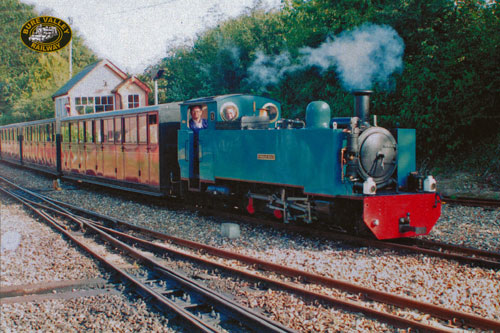
The number 2 is being retained for a proposed new
diesel locomotive
BVR No.3
2nd Air Division USAAF
(Built: 1964 - BVR:1991- )
No.3 is a Bo-Bo diesel hydraulic powered by a Bedford
engine, designed and constructed by John Edwards of Great Yarmouth. Named
2nd Air Division USAAF in 1998 following a major overhaul.
BVR Postcard of BVR No3 2nd Air Division USAAF
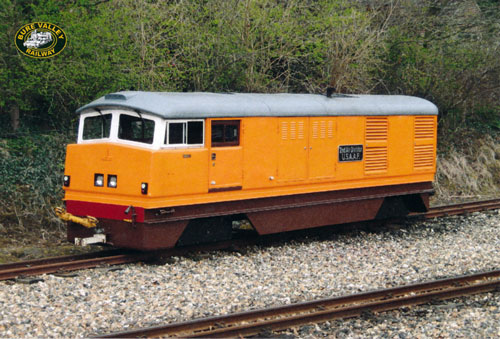
BVR No3 2nd Air Division USAAF removed from
bogies in February 2012
Photo: © Ian Boyle 15th February 2012
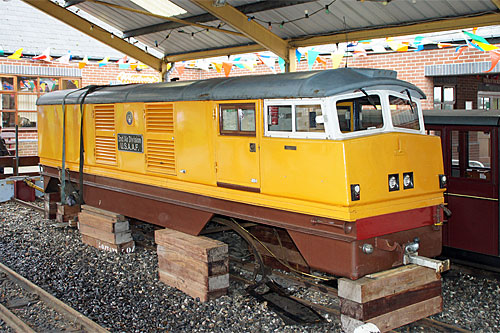
BVR No.4 'Rusty'
(Built: 1954 - BVR:1993- )
No.4 is a Hudson-Hunslet industrial diesel originally
fitted with a 21hp Ailsa engine. She was purchased by the Friends of the
Bure Valley Railway in 1993 and rebuilt with a Peugeot diesel engine and
hydraulic drive. it is unofficially known as Rusty and is used for
pilot and PW duties.
BVR No4 'Rusty' in the yard at Aylsham
Photo: © Ian Boyle 15th February 2012
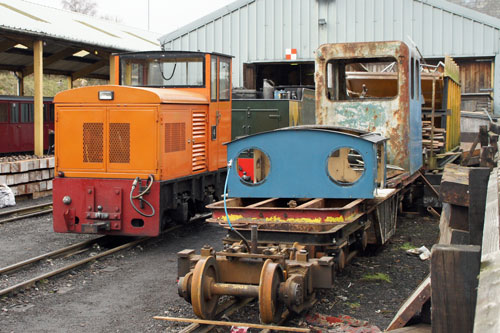
BVR No.5
(Built: 19?? - BVR:19??- )
No.5 is a Lister 0-4-0 industrial diesel mechanical
originally used by Fisons on the Somerset Levels. Regauged from 2ft to
15ins, it has been converted to resemble a Wisbech & Upwell Tramway loco,
the prototypes for Toby the Tram Engine. No5 looked rather tired on my
February 2012 visit.
BVR No5 in the yard at Aylsham
Photo: © Ian Boyle 15th February 2012
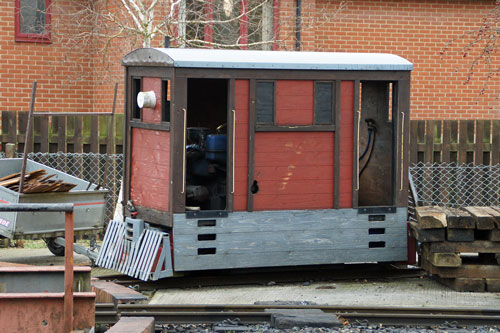
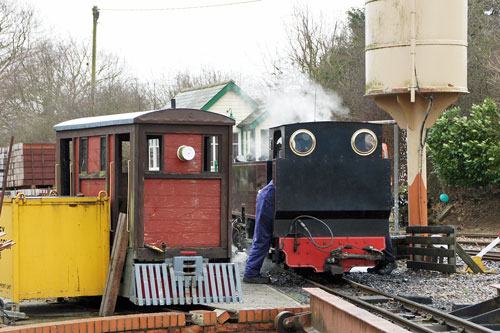
BVR No.6
Blickling Hall
(Built: 1964 - BVR:1994- )
In 1993, Robert Baker took over the main shareholding
and purchased a new loco No.6 Blickling Hall from Winson Engineering. This was a
half-scale version of the ZB 2ft 6in gauge 2-6-2 locos on Indian Railways.
She was joined in 1994 by sister loco No.7 Spitfire.
To be added
BVR No.7
Spitfire
(Built: 1964 - BVR:1994- )
In 1993, Robert Baker took over the main shareholding
and purchased a new loco No.6 Blickling Hall from Winson
Engineering. This was a half-scale version of the ZB 2ft 6in gauge 2-6-2
locos on Indian Railways. She was joined in 1994 by sister loco No.7
Spitfire.
She is
privately owned and leased to the BVR.
BVR Postcard of BVR No7 Spitfire
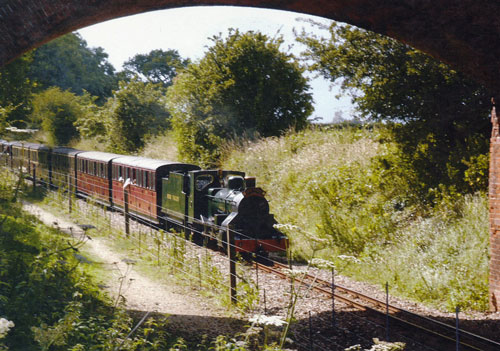
BVR Postcard of BVR No7 Spitfire
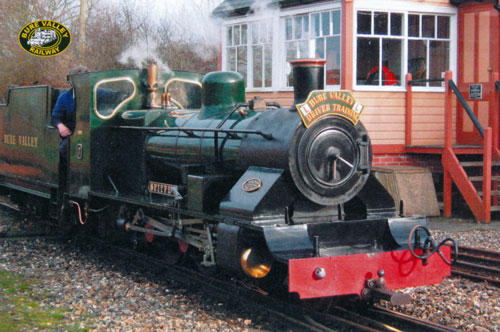
BVR Postcard of BVR No7 Spitfire
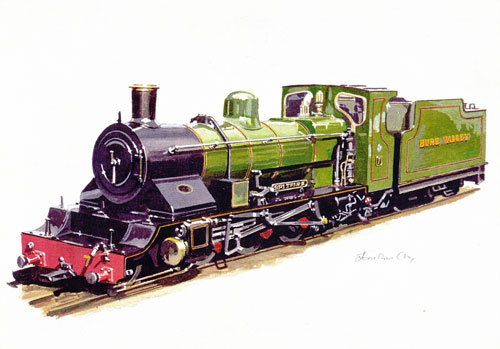
BVR No.8
Thunder
(BVR: 1997- )
BVR
No.8 was the third ZB Class locos supplied to the the railway. Whereas Nos.6
& 7 looked similar to the original Indian ZBs, No.8 is a 2-6-2T based on the
Vale of Rheidol engines. Assembled at Aylsham from components made by Winson
Engineering. She was originally oil fired and was named Thunder due
to the noise this created. However, she was the weakest of the ZBs and
clocked up a low annual mileage. Following conversion to coal firing in
2007-8 the
performance is much improved and she was used extensively in 2011. It is
possible that the name will be changed since it is no longer appropriate.
BVR No8 (unnamed) at Aylsham on the Teddy Express
Photo: © Ian Boyle 15th February 2012
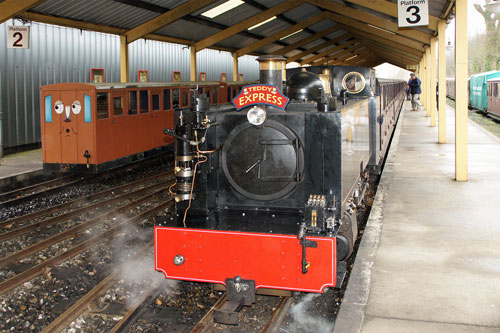
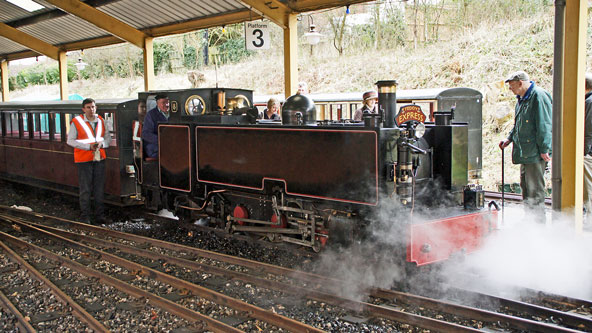
BVR No8 (unnamed) taking water at Aylsham
Photo: © Ian Boyle 15th February 2012
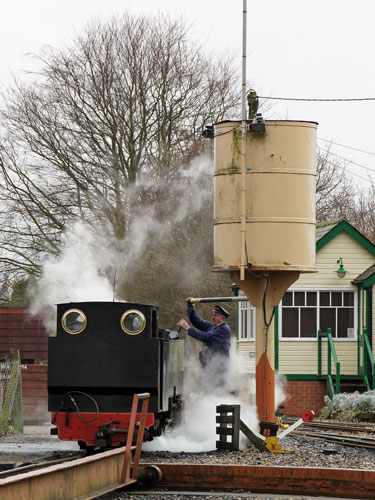
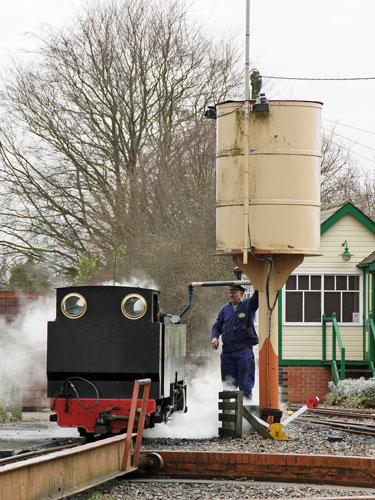
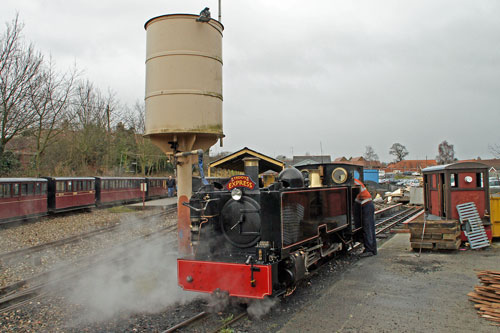
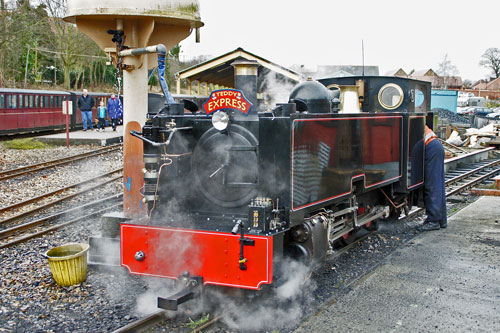
BVR No8 preparing to leave Aylsham
Photo: © Ian Boyle 15th February 2012
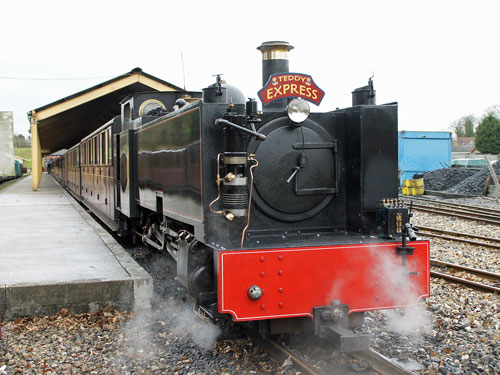
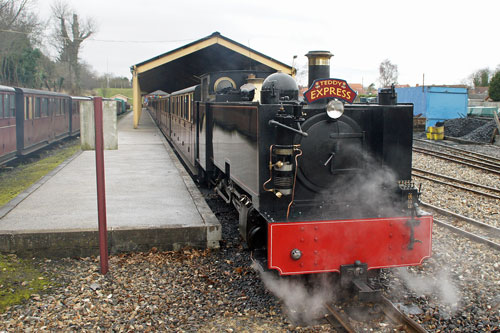
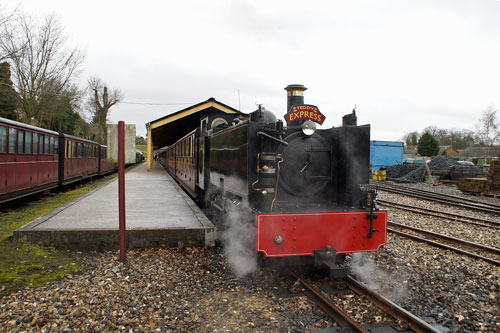
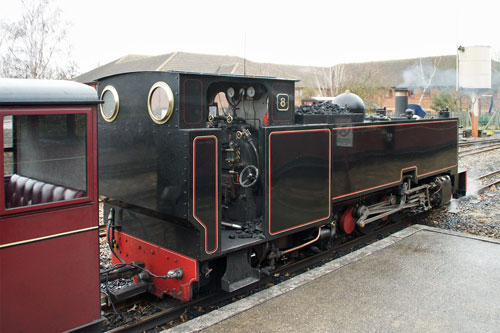
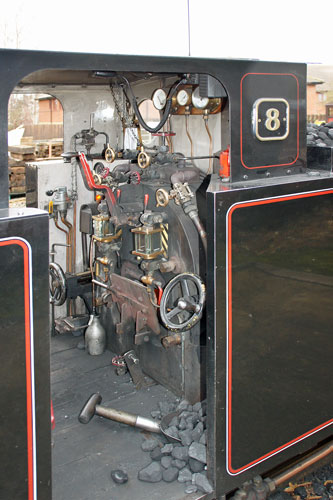
BVR No8 being turned at Wroxham
Photo: © Ian Boyle 15th February 2012
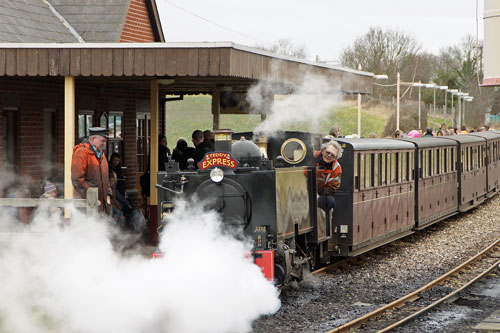
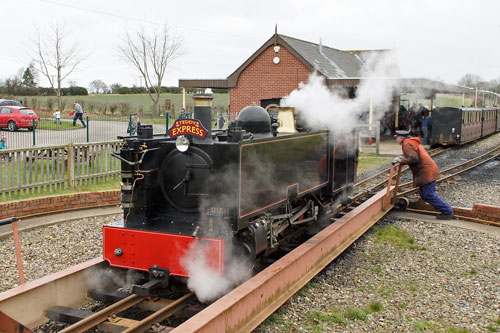
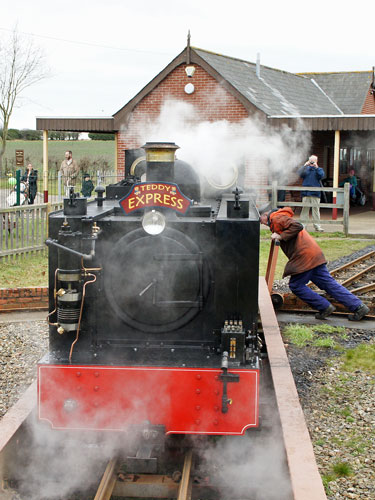
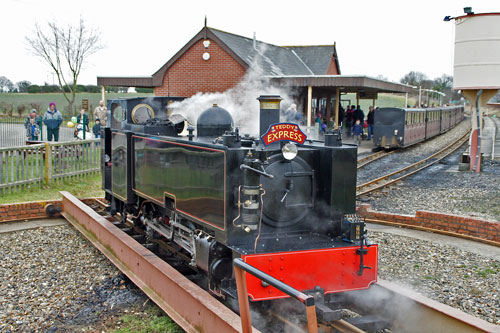
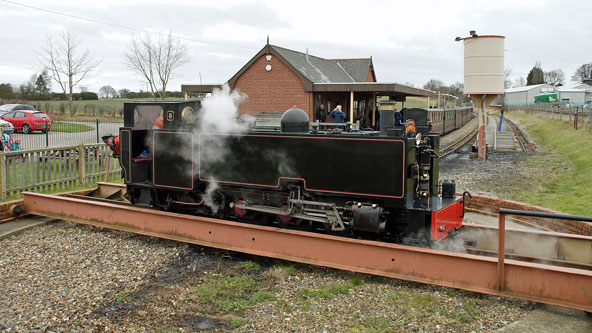
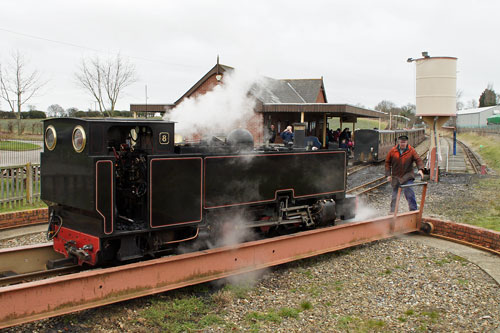
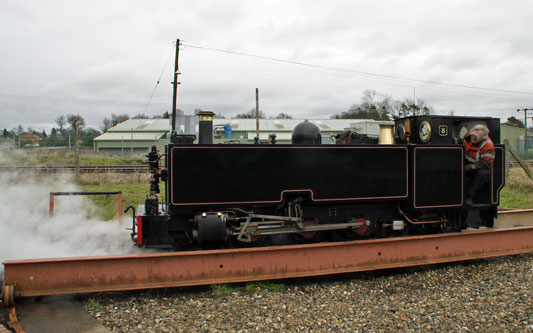
BVR No8 taking water at Wroxham
Photo: © Ian Boyle 15th February 2012
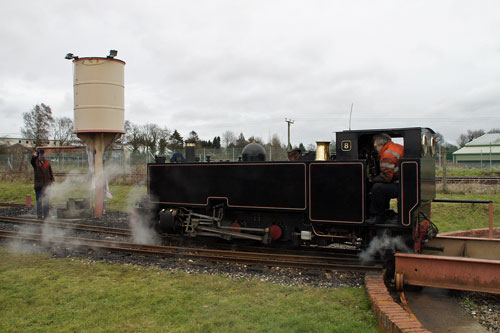
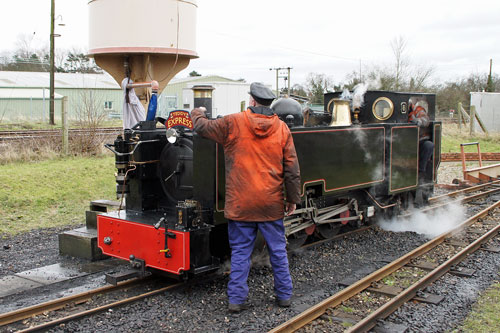
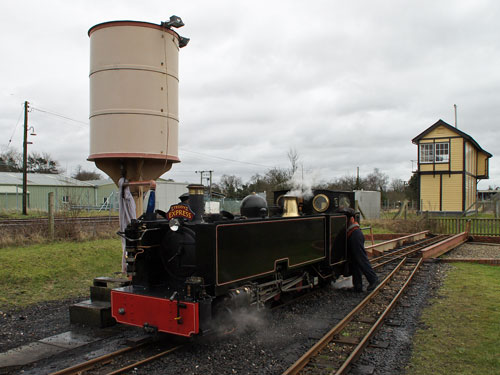
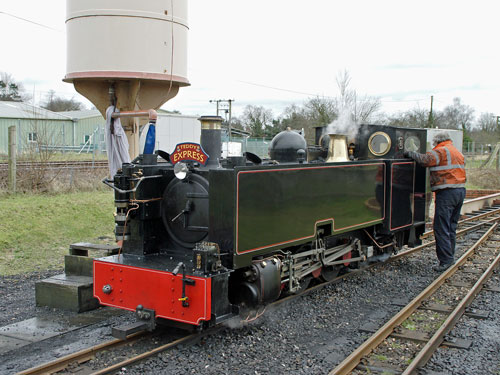
BVR No8 leaving Aylsham
Photo: © Ian Boyle 15th February 2012
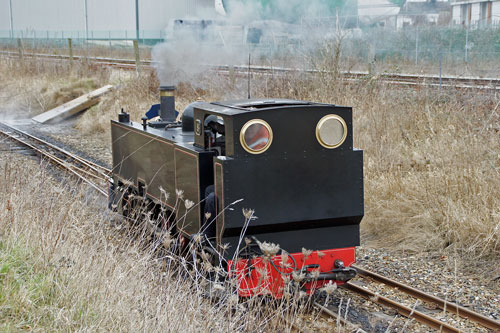
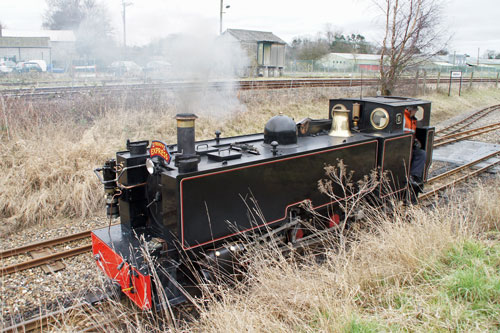
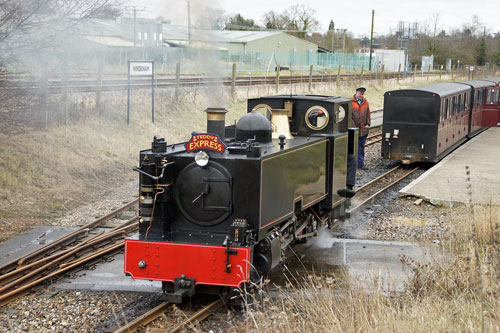
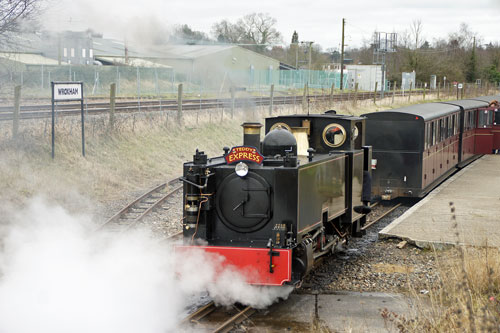
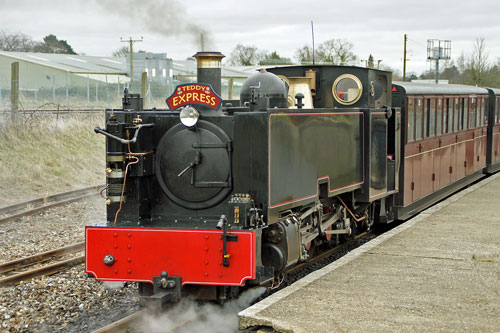
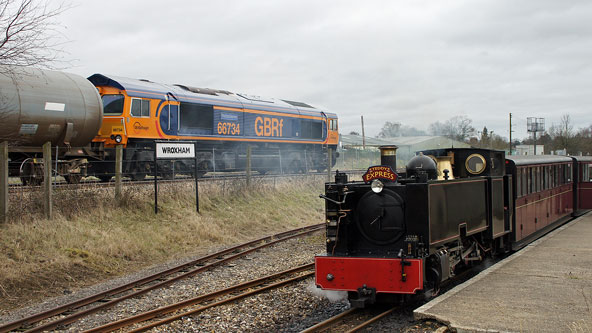
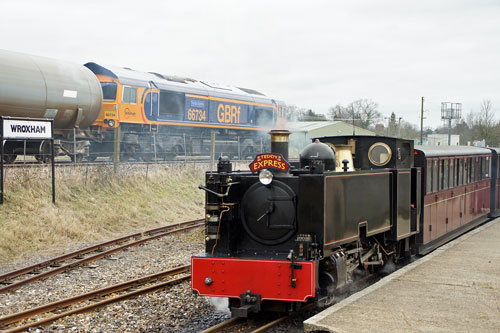
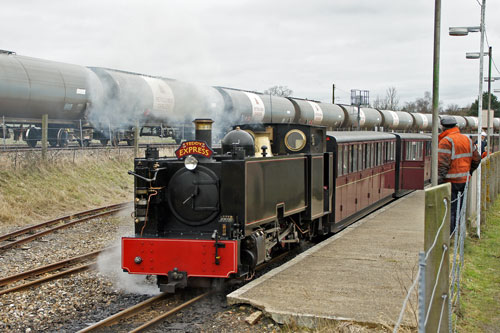
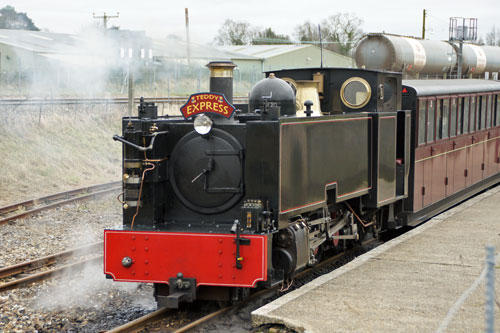
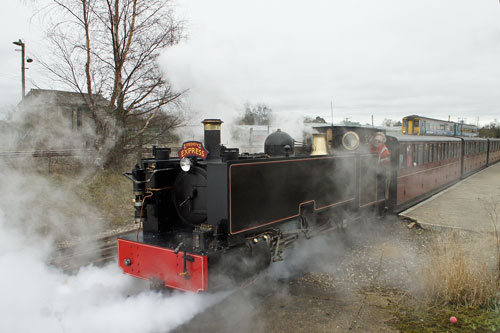
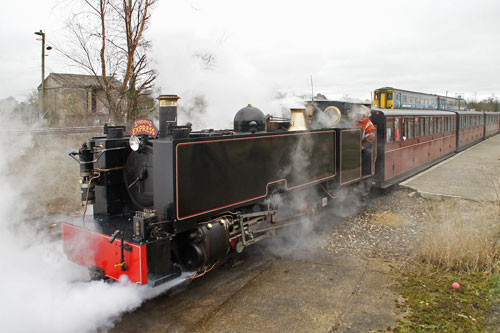
BVR No.9
Mark Timothy
(BVR: 2003- )
BVR
No.9 was the third ZB Class locos supplied to the the railway. Whereas Nos.6
& 7 looked similar to the original Indian ZBs, No.9 is a 2-6-2T based on the
Leek & Manifold engines. Mostly assembled by Winson Engineering and
completed by Alan Keef. She is privately owned and leased to the BVR.
BVR postcard of No9 Mark Timothy
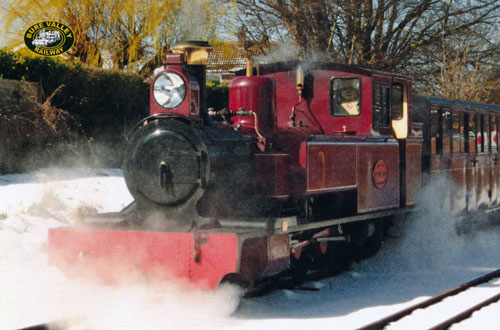
BVR postcard of No9 Mark Timothy
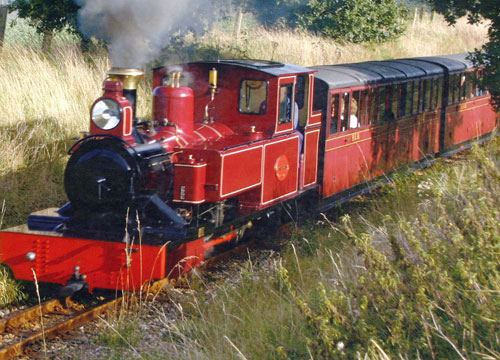
BVR postcard of No9 Mark Timothy
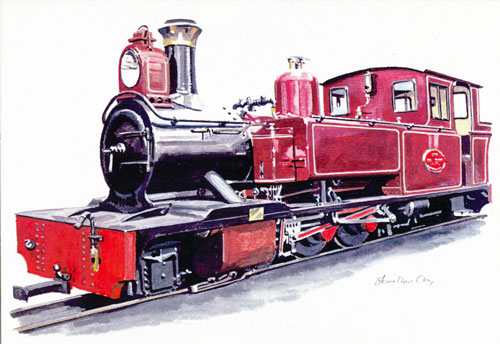
Standard coaches 1-20 were built new in 1989/90. They
are fitted with Westinghouse brakes and electric lighting (necessary for the
tunnel). No.20 was later rebuilt as a guard's van. In recent years coaches
were formed into maroon and brown & cream rakes. Maroon is now the standard
livery and most coaches have been repainted.
BVR standard coach No.1 at Aylsham
Photo: © Ian Boyle 15th February 2012
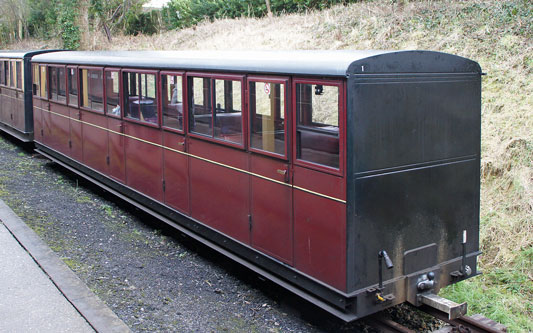
BVR standard coach No.2 at Wroxham
Photo: © Ian Boyle 15th February 2012
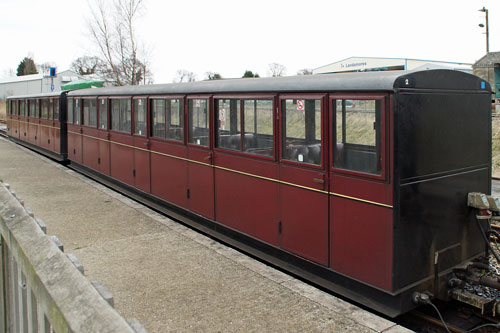
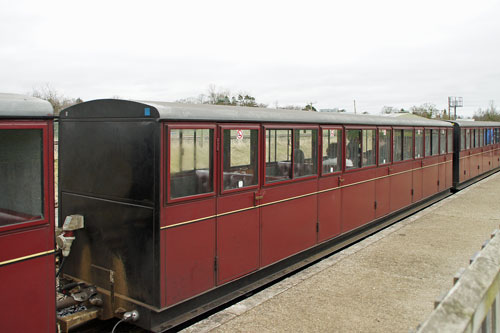
BVR standard coach No.3 at Aylsham, still in brown &
cream
Photo: © Ian Boyle 15th February 2012
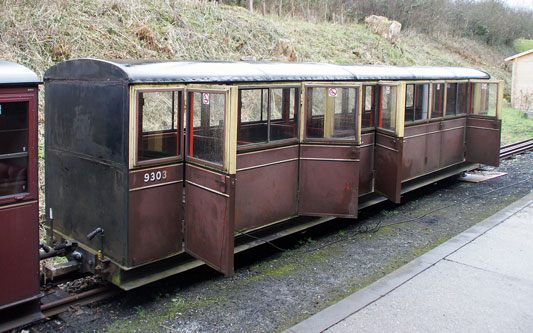
BVR standard coach No.4 at Wroxham
Photo: © Ian Boyle 15th February 2012
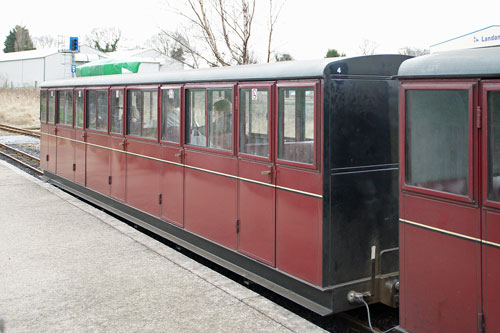
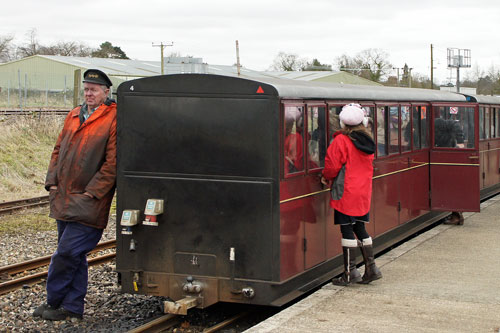
BVR standard coach No.7 at Wroxham
Photo: © Ian Boyle 15th February 2012
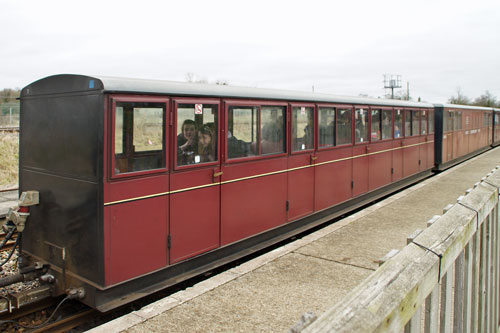
BVR standard coach No.11 at Aylsham
Photo: © Ian Boyle 15th February 2012
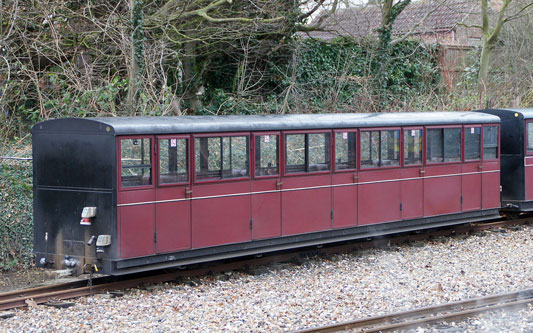
BVR standard coach No.13 at Aylsham
Photo: © Ian Boyle 15th February 2012
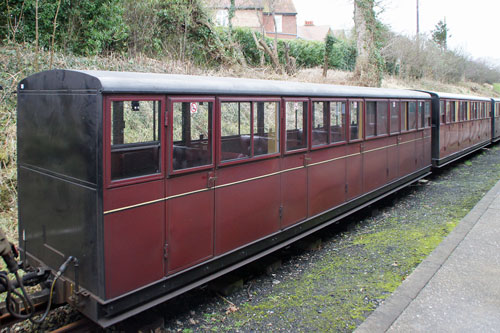
BVR standard coach No.15 at Aylsham, still in brown &
cream livery
Photo: © Ian Boyle 15th February 2012
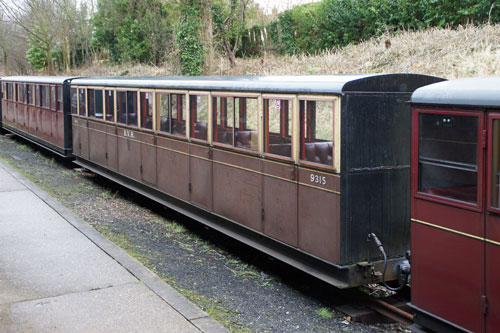
BVR standard coach No.18 at Aylsham
Photo: © Ian Boyle 15th February 2012
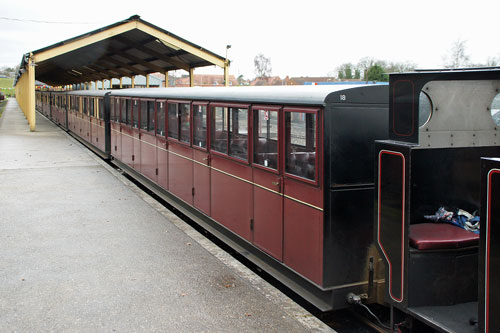
BVR standard coach No.19 at Aylsham
Photo: © Ian Boyle 15th February 2012
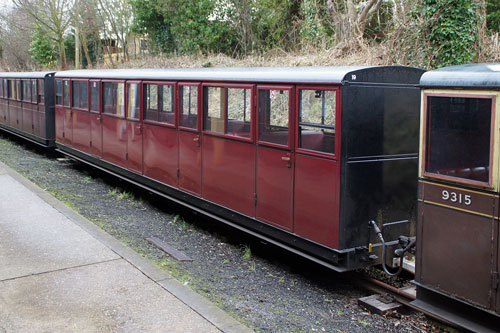
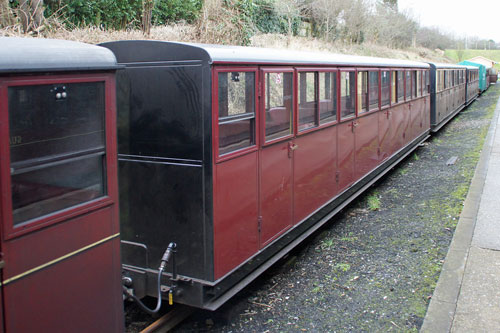
The Guard's Van 20 was the last of the standard
coaches 1-20 rebuilt with guard's and luggage areas plus retaining 8
passenger seats.
BVR guard's van 20
Photo: © Ian Boyle 15th February 2012
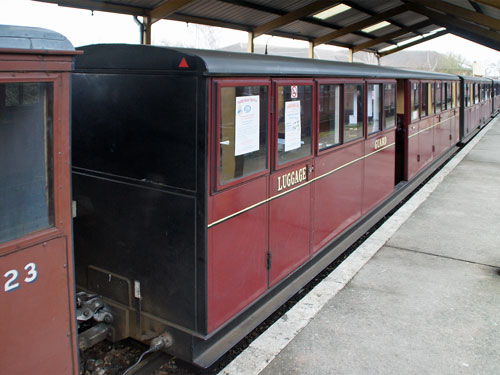
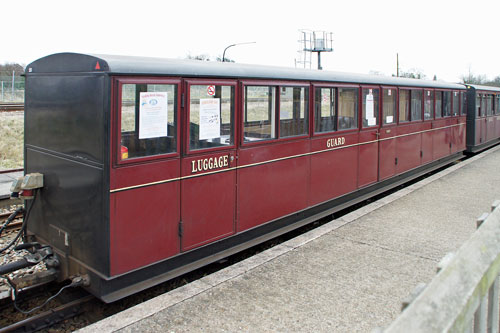
The Generator Van was the prototype coach of the BVR
built in 1988. Displaced by the series built standard coaches 1-19 by 1994,
it was rebuilt as a generator van to supply heating on winter trains and to
provide power for maintenance works. It carries a brown livery.
BVR generator van 2623
Photo: © Ian Boyle 15th February 2012
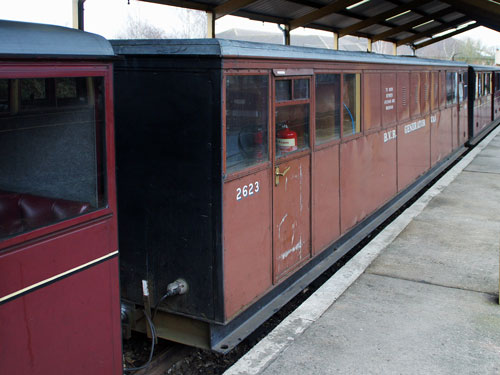
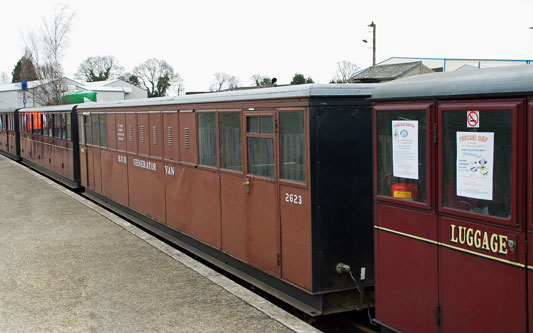
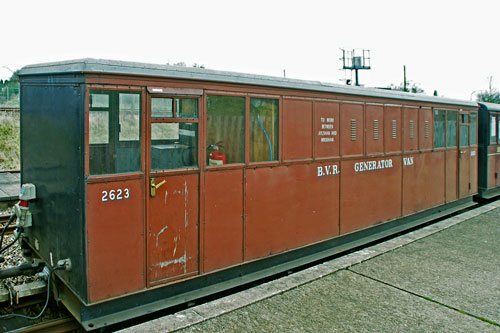
Special saloons 30-35 have a central saloon area
fitted with ramps and suitable for wheelchairs, pushchairs etc 30-31 were
built in 1998 and 32-25 in 2002.
BVR saloon 34
Photo: © Ian Boyle 15th February 2012
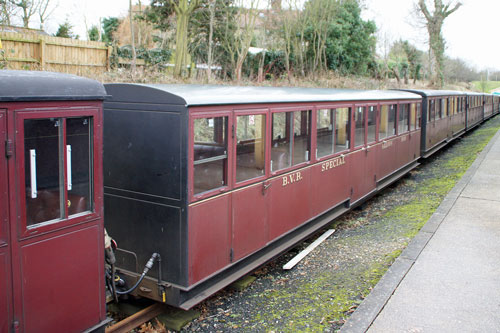
BVR saloon 35
Photo: © Ian Boyle 15th February 2012
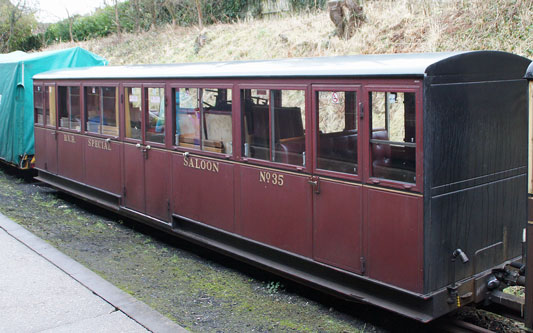
Coach Nos.81-82 are four wheel guard's vans.
BVR generator van 2623
Photo: © Ian Boyle 15th February 2012
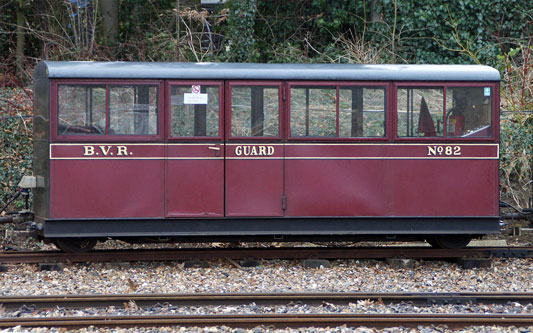
Coach Nos.123 & 125 are ex-Fairbourne Railway. They
are privately owned and loaned to the BVR. In 2012 they were in Rev.Awdrey
livery as Annie and Clarabel.
ex-Fairbourne coaches 125 and 123
Photo: © Ian Boyle 15th February 2012
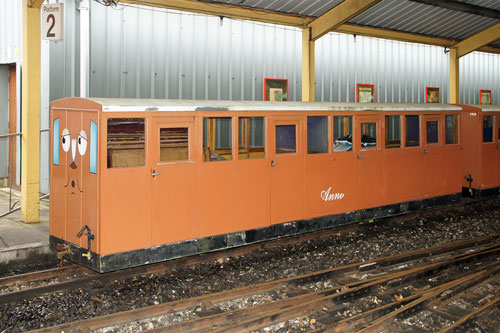
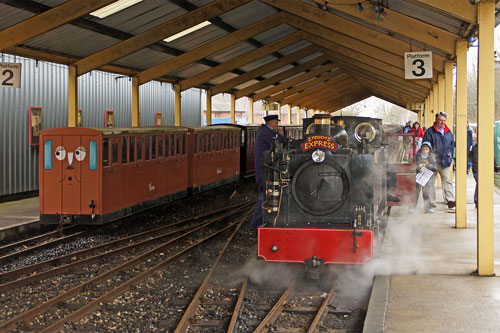
The main station and shed for the BVR is Aylsham. The
station has an overall roof which also protects the rolling stock.
Aylsham station with BVR No.8
Photo: © Ian Boyle 15th February 2012

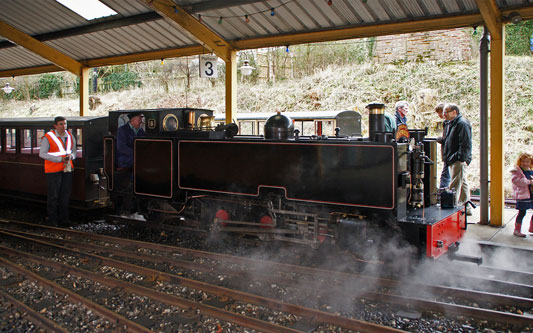
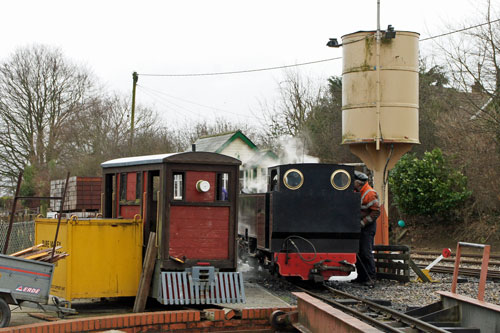
The the other terminus station for the BVR is
Wroxham, adjacent to national rail station Hoveton & Wroxham.
Wroxham station with BVR No.8
Photo: © Ian Boyle 15th February 2012
